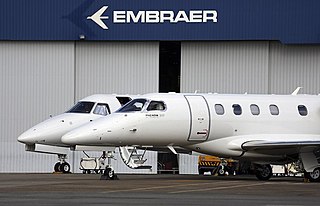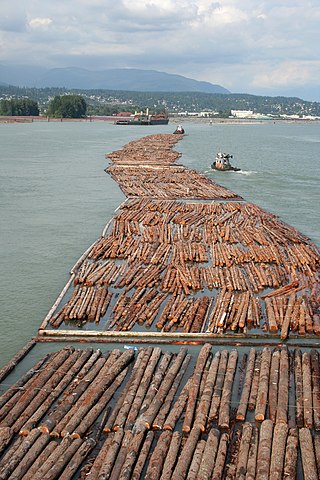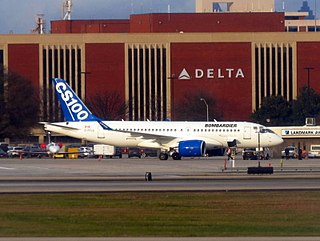Related Research Articles

The World Trade Organization (WTO) is an intergovernmental organization that regulates and facilitates international trade. With effective cooperation in the United Nations System, governments use the organization to establish, revise, and enforce the rules that govern international trade. It officially commenced operations on 1 January 1995, pursuant to the 1994 Marrakesh Agreement, thus replacing the General Agreement on Tariffs and Trade (GATT) that had been established in 1948. The WTO is the world's largest international economic organization, with 164 member states representing over 98% of global trade and global GDP.
Foreign Sales Corporation (FSC) was a type of tax device allowed under the United States Internal Revenue Code that allowed companies to receive a reduction in U.S. federal income tax for profits derived from exports.
Bombardier Aviation is a division of Bombardier Inc. It is headquartered in Dorval, Quebec, Canada. Its most popular aircraft included the Dash 8 Series 400, CRJ100/200/440, and CRJ700/900/1000 lines of regional airliners, and the newer CSeries. It also manufactured the Bombardier 415 amphibious water-bomber, and currently makes the Global Express and the Challenger lines of business jets.

Embraer S.A. is a Brazilian multinational aerospace manufacturer that produces commercial, military, executive and agricultural aircraft, and provides aeronautical services. It was founded in 1969 in São José dos Campos, São Paulo, where its headquarters are located. The company is the third largest producer of civil aircraft, after Boeing and Airbus.
An amicus curiae is an individual or organization who is not a party to a legal case, but who is permitted to assist a court by offering information, expertise, or insight that has a bearing on the issues in the case. The decision on whether to consider an amicus brief lies within the discretion of the court. The phrase is legal Latin and the origin of the term has been dated to 1605–1615. The scope of amici curiae is generally found in the cases where broad public interests are involved and concerns regarding civil rights are in question.

The Canada–U.S. softwood lumber dispute is one of the largest and most enduring trade disputes between both nations. This conflict arose in 1982 and its effects are still seen today. British Columbia, the major Canadian exporter of softwood lumber to the United States, was most affected, reporting losses of 9,494 direct and indirect jobs between 2004 and 2009.

The Doha Development Round or Doha Development Agenda (DDA) is the trade-negotiation round of the World Trade Organization (WTO) which commenced in November 2001 under then director-general Mike Moore. Its objective was to lower trade barriers around the world, and thus facilitate increased global trade.
An export credit agency or investment insurance agency is a private or quasi-governmental institution that acts as an intermediary between national governments and exporters to issue export insurance solutions and guarantees for financing. The financing can take the form of credits or credit insurance and guarantees or both, depending on the mandate the ECA has been given by its government. ECAs can also offer credit or cover on their own account. This does not differ from normal banking activities. Some agencies are government-sponsored, others private, and others a combination of the two.
The Agreement on the Application of Sanitary and Phytosanitary Measures, also known as the SPS Agreement or just SPS, is an international treaty of the World Trade Organization (WTO). It was negotiated during the Uruguay Round of the General Agreement on Tariffs and Trade (GATT), and entered into force with the establishment of the WTO at the beginning of 1995. Broadly, the sanitary and phytosanitary ("SPS") measures covered by the agreement are those aimed at the protection of human, animal or plant life or health from certain risks.

Export Development Canada is Canada's export credit agency and a state-owned enterprise wholly owned by the Government of Canada. Its mandate is to support and develop trade between Canada and other countries, and help Canada's competitiveness in the international marketplace.

A regional jet (RJ) is a jet-powered regional airliner with fewer than 100 seats. The first one was the Sud-Aviation Caravelle in 1959, followed by the widespread Yakovlev Yak-40, Fokker F-28, and BAe 146. The 1990s saw the emergence of the most widespread Canadair Regional Jet and its Embraer Regional Jet counterpart, then the larger Embraer E-Jet and multiple competing projects. In the US, they are limited in size by scope clauses.
Dispute settlement or dispute settlement system (DSS) is regarded by the World Trade Organization (WTO) as the central pillar of the multilateral trading system, and as the organization's "unique contribution to the stability of the global economy". A dispute arises when one member country adopts a trade policy measure or takes some action that one or more fellow members consider to be a breach of WTO agreements or to be a failure to live up to obligations. By joining the WTO, member countries have agreed that if they believe fellow members are in violation of trade rules, they will use the multilateral system of settling disputes instead of taking action unilaterally — this entails abiding by agreed procedures—Dispute Settlement Understanding—and respecting judgments, primarily of the Dispute Settlement Board (DSB), the WTO organ responsible for adjudication of disputes.

The competition between Airbus and Boeing has been characterized as a duopoly in the large jet airliner market since the 1990s.
The Brazil–United States cotton dispute was a World Trade Organization dispute settlement case (DS267) on the issue of unfair subsidies on cotton. In 2002, Brazil—a major cotton export competitor—expressed its growing concerns about United States cotton subsidies by initiating a WTO dispute settlement case against certain features of the U.S. cotton program. On March 18, 2003, a Panel was established to adjudicate the dispute. Argentina, Canada, China, Chinese Taipei, the European Communities, India, Pakistan, and Venezuela participated as third parties. Focusing on six specific claims relating to US payment programmes, Brazil argued that the US had failed to abide by its commitments in the Uruguay Round Agreement on Agriculture (AoA) and the Agreement on Subsidies and Countervailing Measures (SCM). On September 8, 2004, a WTO dispute settlement (DS) panel ruled against the United States on several key issues in case.
On January 26, 1999, the European Community (EC) and its Member States requested consultation with the United States concerning a dispute over discrepancies between the WTO Agreement on Trade-Related Aspects of Intellectual Property Rights and Section 110(5) of the United States Copyright Act amended by the Fairness in Music Licensing Act. The dispute was over the legality of "the playing of radio and television music in public places without the payment of a royalty fee" (World). The disputed parties worked through the existing process of WTO Dispute Settlement. First the EC lodged a complaint against the US with the Dispute Settlement Body (DSB) and requested consultation over the dispute. Then the parties requested a panel leading to the body's eventual formation, followed by the circulation of the panel report. The parties accepted the Panel Report without appeal and the dispute ended in arbitration over implementation of the panel's recommendations. Australia, Brazil, Canada, Japan, and Switzerland acted as third parties in this dispute (World).
Non-violation nullification of benefits (NVNB) claims are a species of dispute settlement in the World Trade Organization arising under World Trade Organization multilateral and bilateral trade agreements. NVNB claims are controversial in that they are widely perceived to promote the social vices of unpredictability and uncertainty in international trade law. Other commentators have described NVNB claims as potentially inserting corporate competition policy into the World Trade Organization Dispute Settlement Understanding (DSU).
In the 1990s, a trade dispute over fresh salmon arose between the Commonwealth nations of Canada and Australia. In 1995, Canada made a complaint to the World Trade Organization, of which both countries are members, about Australia's restriction on imports of fresh salmon, which were part of a quarantine measure for health purposes.
In 1996, the European Community and United States filed complaints with the WTO against Japan concerning their distribution and protection of sound recordings that originated in their respective states. Both disputes accused Japan of violating numerous articles of the TRIPS Agreement. Both disputes were settled in December 1997, with the involved parties finding mutually agreeable solutions. DS28 was the first case ever brought to the WTO's dispute settlement body based on the TRIPS Agreement.

On 28 April 2016, Bombardier Aerospace recorded a firm order from Delta Air Lines for 75 CSeries CS100s plus 50 options. On 27 April 2017, Boeing filed a petition for dumping them at $19.6m each, below their $33.2m production cost.

The John H. Jackson Moot Court Competition. is an international moot court competition on WTO law. The competition takes place on a yearly basis, with its first edition dating back to 2002. The competition was formerly known as ELSA Moot Court Competition on WTO but has been renamed in 2018 after the American professor of law John Howard Jackson.
References
- ↑ WTO: Disputes by country/territory wto.org
- ↑ DISPUTE SETTLEMENT: DISPUTE DS46; Brazil — Export Financing Programme for Aircraft wto.org
- ↑ DISPUTE SETTLEMENT: DISPUTE DS70; Canada — Measures Affecting the Export of Civilian Aircraft wto.org
- ↑ DISPUTE SETTLEMENT: DISPUTE DS71; Canada — Measures Affecting the Export of Civilian Aircraft wto.org
- ↑ DISPUTE SETTLEMENT: DISPUTE DS222; Canada — Export Credits and Loan Guarantees for Regional Aircraft wto.org
- ↑ "WTO - dispute settlement - the disputes - DS522". www.WTO.org. Retrieved 9 January 2018.
- ↑ "Hurricane Harvey curbs U.S. consumer spending; inflation muted". Reuters. 29 September 2017. Retrieved 9 January 2018.
- ↑ "WTO to also probe alleged Bombardier subsidies into CSeries jets". CBC.ca. Retrieved 9 January 2018.
- ↑ "U.S. Demands on Nafta Risk Scuttling Trade Talks". Bloomberg. 29 September 2017. Retrieved 9 January 2018– via www.Bloomberg.com.
- ↑ "Bombardier suffers another blow as WTO to probe subsidies in Brazil row". TheGlobeAndMail.com. 29 September 2017. Retrieved 9 January 2018.
- 1 2 WT/DS46/R 14 April 1999 (99-1402) Original: English BRAZIL - EXPORT FINANCING PROGRAMME FOR AIRCRAFT: REPORT OF THE PANEL [ permanent dead link ] wto.org
- 1 2 Canada, Brazil Lose WTO Plane Cases By Charles Goldsmith and Christopher J. Chipello. Wall Street Journal. (Europe). Brussels: Mar 15, 1999. pg. 5
- 1 2 WT/DS46/RW 9 May 2000 (00-1749) Original: English BRAZIL - EXPORT FINANCING PROGRAMME FOR AIRCRAFT: RECOURSE BY CANADA TO ARTICLE 21.5 OF THE DSU; Report of the panel [ permanent dead link ] wto.org
- ↑ Embraer: The Sky's the Limit Archived February 18, 2009, at the Wayback Machine businessweek.com, January 15, 2001
- ↑ WTO backs Brazil's Proex programme allbusiness.com, Thursday, July 12, 2001
- ↑ "WT/DS46/RW/2 26 July 2001 (01-3570) Original: English BRAZIL - EXPORT FINANCING PROGRAMME FOR AIRCRAFT: Second Recourse by Canada to Article 21.5 of the DSU; Report of the Panel". WTO.org. Retrieved 9 January 2018.[ permanent dead link ]
- 1 2 WT/DS70/R 14 April 1999 (99-1398) Original: English CANADA - MEASURES AFFECTING THE EXPORT OF CIVILIAN AIRCRAFT; REPORT OF THE PANEL [ permanent dead link ] wto.org
- 1 2 3 WT/DS222/R 28 January 2002 (02-0153) Original: English CANADA - EXPORT CREDITS AND LOAN GUARANTEES FOR REGIONAL AIRCRAFT; Report of the Panel [ permanent dead link ] wto.org
- ↑ Canada told to end subsidy NEWS DIGEST; [London edition] Williams, Frances. Financial Times. London (UK): Jan 29, 2002. pg. 10
- 1 2 WTO rules against Canada over low-interest loans for Bombardier deal cbc.ca, Friday, October 19, 2001, 7:58 PM ET